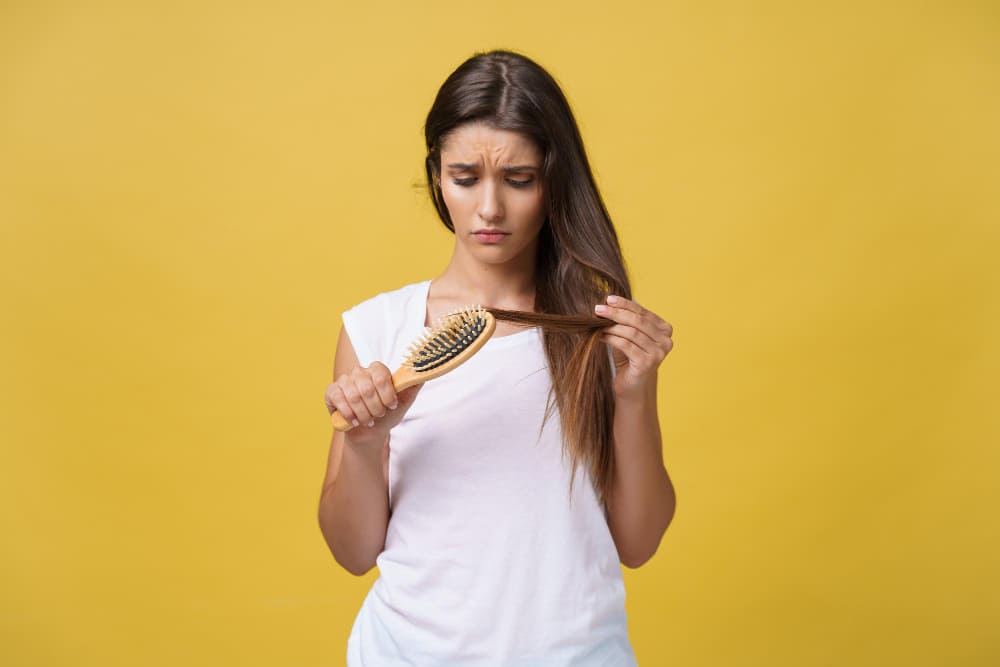In the realm of health concerns, the relationship between aspirin and hair loss has sparked various debates and inquiries. Let’s delve into the complexities surrounding this topic “Can Aspirin Cause Hair Loss?”to observe the potential effects of this extensively used prescription on hair health.
Exploring the Impact of Aspirin on Hair Health
Aspirin, a generally used non-prescription cure known for its capability to decrease pain and reduce inflammation, is extensively utilized to treat different situation. However, there have been worries about its possible link to hair loss.

Read More👉 Keratin Treatment for Curly Hair: A Comprehensive Guide
Mechanisms of Medication-Induced Hair Loss:
There are several mechanisms through which medications can contribute to hair loss:
a. Anagen Effluvium:
Anagen effluvium is a type of hair loss often caused by potent medications used in chemotherapy and These medications damage hair follicles in the growth phase, leading to hair loss.
b. Telogen Effluvium:
Telogen effluvium is a hair loss condition that typically occurs 2 to 4 months after starting or stopping certain medications. but the exact relationship between telogen effluvium and medication is not fully understood.
c. Androgenetic Alopecia:
Some medications may trigger or exacerbate androgenetic alopecia, a hereditary form of hair loss associated with hormonal factors.
d. Alopecia Areata:
Medications can also contribute to alopecia areata, an autoimmune condition characterized by patchy hair loss.
Read More👉 How to Detangle Matted Hair: A Comprehensive Guide
Medications that Can Cause Hair Loss:
In addition to aspirin, various medications have been associated with hair loss. These include:
- Vitamin A: Extreme use of vitamin A, especially with acne medications like Accutane, can cause hair loss, possibly due to vitamin A toxicity.
- NSAIDs: Non-steroidal anti-inflammatory drugs (NSAIDs), such as aspirin and ibuprofen, have been linked to hair loss by increasing stress levels and hastening the telogen stage of hair growth.
- Antibiotics: Some types of antibiotics can reduce the levels of vitamin B and hemoglobin in the body, which may result in hair loss.
- Oral Contraceptives: Some oral contraceptives containing male hormones (androgens) can contribute to hair loss, while others with anti-androgenic properties may help promote hair growth.
- Other Medications: The risk for causing hair loss is known to exist for chemotherapy drugs, fungal infection medications, statins, blood thinners, antidepressants, testosterone therapies, pharmaceuticals for weight loss, and anabolic steroids.
Read More👉 How to Dye Synthetic Hair: A Detailed Step-by-Step Guide
Treatment and Prevention:
Managing medication-induced hair loss involves various approaches:
1) Hair Loss from Chemotherapy:
Hair loss associated with chemotherapy is expected but temporary. However, Wearing a wig, scarf, or hat can help disguise hair loss during treatment.
2) Hair Loss from Other Medications:
Consultation with a healthcare professional is crucial to discuss possible alternatives or adjustments to medication dosage to minimize hair loss.
3) The Role of Balanced Lifestyle
Emphasizing the significance of a holistic approach, incorporating a balanced diet, regular exercise, and stress management techniques can contribute to optimal health and well-being. Implementing these lifestyle practices alongside any necessary medications can potentially foster a harmonious balance in one’s overall health
4) Topical Treatments:
Topical treatments like minoxidil may be recommended to promote hair growth and thickness.
5) Hair Transplant:
People who are experiencing more severe hair loss may consider getting a hair transplant, which is a permanent remedy.
Read More👉 How to Diffuse Curly Hair: Step-By-Step Guide
Nurturing Hair Health
Adopting a hair care routine tailored to individual needs is essential for maintaining healthy, vibrant hair. In addition, utilizing gentle hair care products, minimizing heat and chemical treatments, and ensuring adequate nutrition can help promote strong, lustrous hair, potentially mitigating concerns related to hair loss.
Conclusion: Understanding the Nuances
In conclusion, while the notion of “can aspirin cause hair loss?” remains a topic of interest and concern, current scientific evidence does not definitively support this claim. Prioritizing open communication with healthcare providers, adopting a holistic approach to well-being, and maintaining a personalized hair care regimen can collectively contribute to fostering optimal health and addressing any potential concerns related to hair loss.
FAQs
While there is no direct evidence linking aspirin to hair loss, some individuals have reported experiencing hair thinning or hair loss as a potential side effect of taking aspirin.
Ensuring a well-balanced diet rich in essential nutrients, maintaining proper hydration. Adopting a gentle hair care routine are helpful measures to support healthy hair, even if you’re taking aspirin.
It’s crucial not to abruptly stop taking any medication without consulting your healthcare provider. They can guide you on whether to continue, adjust your dosage, or explore alternative treatments if necessary.
Your doctor can discuss alternative medications for your specific health condition if aspirin is causing significant concerns about hair loss.
Yes, maintaining a balanced lifestyle, reducing stress, and adopting a hair care regimen that avoids excessive heat and chemicals can contribute to healthy hair, even if you’re using aspirin.

